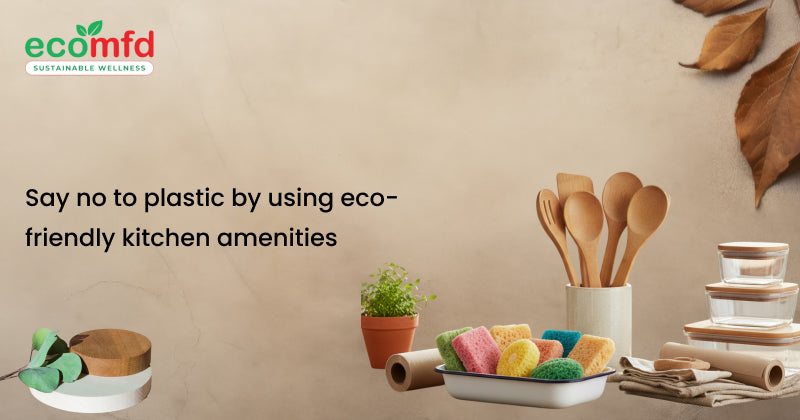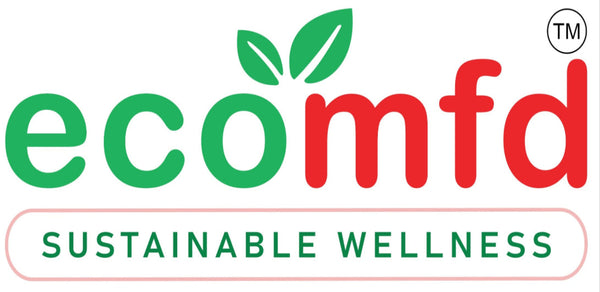
Say No to Plastic by Using Eco-Friendly Kitchen Amenities
Share
The Plastic Problem in Our Kitchens
In today’s kitchens, plastic is everywhere from utensils and storage containers to wraps and dustbins. While plastic may seem convenient and inexpensive, it brings significant environmental damage. Most plastics take centuries to decompose, breaking into microplastics that contaminate soil, waterways, and the food chain. Heat exposure can cause plastics to leach harmful chemicals into food, jeopardizing health.
Reducing plastic use in the kitchen is a critical first step towards sustainable living. Switch to organic, biodegradable, and eco-friendly alternatives and create a healthier home and planet.
Essential Eco-Friendly Kitchen Amenities
Transitioning away from plastic means replacing daily kitchen tools with ones made from natural, renewable, and biodegradable resources like bamboo, wood, or wheat husk composites. These materials not only biodegrade quickly but also avoid chemical leaching and offer durability.
Here are some must-have eco kitchen amenities essentials from Ecomfd:
Pizza Bat
A traditional wooden pizza bat is ideal for rolling out dough smoothly. Unlike plastic rolling pins, it is crafted from solid natural wood, making it sturdy, chemical-free, and biodegradable.
Belan & Chakla
These classic Indian rolling tools - the wooden rolling pin (belan) and flat board (chakla) are perfect for preparing various flatbreads. Made from sustainably sourced wood, they provide long-lasting use without harming the environment.
Masala Box
Keep your spices fresh and neatly organized in a wooden masala box made of organic bamboo or stainless steel. Switch away from plastic containers to reduce waste and chemicals in food storage.
Cooking Set
Opt for cookware made from cast iron or natural composites that avoid plastic coatings like eco-friendly wooden cooking sets. These sets offer great longevity and healthier cooking without the risk of plastic-related toxins.
Cutlery Set
Eco-friendly cutlery made from bamboo or wood combines practicality with sustainability. These utensils are lightweight, durable, and naturally antimicrobial.
Coaster Set
Protect your kitchen surfaces with coasters crafted from biodegradable bamboo or cork. They serve as stylish, eco-conscious accessories to prevent heat and moisture damage.
Chopping Board
Wooden or bamboo chopping boards are gentle on knives and inherently antimicrobial, unlike plastic boards which can harbor bacteria. Their natural fibers ensure safer food prep.
Dustbin
Replace plastic bins with wooden dustbins made from bamboo or recycled wood. These durable bins resist stains, recycle well, and biodegrade at the end of their life.
Tray
Serving trays made from bamboo or natural wood add elegance and eco-friendliness to meal times. At their end of life, they compost naturally.
Plastic vs Stainless Steel vs Bamboo Utensils: Which is Better?
Choosing utensils can influence your kitchen’s environmental footprint and your health. Here’s a quick comparison of the three most common types:
|
Feature |
Plastic Utensils |
Stainless Steel Utensils |
Bamboo Utensils |
|
Environmental Impact |
High pollution; non-biodegradable; creates microplastics |
Recyclable; energy-intensive production process |
Renewable; fast-growing; fully biodegradable |
|
Health & Safety |
May leach toxic chemicals when heated |
Safe; no chemical leaching |
Naturally antimicrobial; chemical-free |
|
Durability |
Low; melts, cracks, degrades quickly |
Very high; withstands heavy use |
Moderate; strong but sensitive to moisture |
|
Maintenance |
Dishwasher safe but degrades over time |
Easy to clean; dishwasher safe |
Requires hand wash; occasional oiling |
|
Texture & Usability |
Lightweight but can melt or warp |
Solid, heavy, heat-conductive |
Lightweight; comfortable grip; natural texture |
|
Aesthetic Appeal |
Often cheap-looking and plain |
Sleek, modern, formal look |
Warm, rustic, natural look |
|
End-of-Life |
Non-biodegradable; lasts centuries |
Recyclable but not biodegradable |
Biodegradable and compostable |
Why Bamboo Is the Best Choice
Bamboo combines sustainability, safety, and beauty. It grows rapidly without pesticides and requires minimal water. Bamboo utensils naturally resist bacteria and mold and biodegrade safely after years of use. Compared to plastic, it is non-toxic and environmentally gentle, making it the ideal choice for eco-friendly kitchens.
Benefits of Using Eco-Friendly Kitchen Amenities
- Significant Reduction in Plastic Waste: Switching to biodegradable products cuts landfill burdens and ocean pollutants dramatically.
- Healthier Food Preparation: Organic materials avoid chemical leaching common with plastics, ensuring safer meals.
- Aesthetic and Functional: Natural wood and bamboo offer warmth and durability, enhancing the kitchen’s overall appeal.
- Cost-Effective Durability: High-quality organic kitchen tools last longer, saving money over single-use or cheap plastic alternatives.
- Closed Loop Lifecycle: Products like bamboo utensils and chopping boards return safely to nature as compost, completing the sustainability circle.
Tips to Create Your Plastic-Free Kitchen
- Start swapping frequently used plastic tools such as spatulas, trays, and storage bins with bamboo or wood alternatives.
- Use multi-purpose products to reduce clutter and waste.
- Compost food scraps with an organic dustbin or countertop composter.
- Educate household members about sustainable kitchen habits.
- Support brands committed to organic, biodegradable, and ethical production methods.
Why Trust Brands Like Ecomfd?
Ecomfd offers an extensive collection of organic, biodegradable kitchen amenities. Their dedication to sustainable sourcing ensures products are eco-friendly from manufacture through disposal. By choosing quality manufacturers like Ecomfd, consumers embrace responsible consumption patterns crucial for environmental recovery.
What makes bamboo more eco-friendly than plastic or stainless steel?
Bamboo renews quickly, is 100% biodegradable, and involves far less water and chemical inputs in production compared to plastic or stainless steel.
When comparing bamboo vs plastic, bamboo clearly stands out as the eco-friendly choice. It grows rapidly and regenerates without replanting, making it highly renewable. Unlike plastic or stainless steel, bamboo is 100% biodegradable and decomposes naturally without leaving harmful residues. Its production also consumes far less water and chemicals, reducing environmental impact while providing a sustainable alternative for everyday products.
Conclusion
Saying no to plastic in the kitchen isn’t just a trend - it’s a necessary evolution for healthier homes and a healthier planet. From pizza bats and masala boxes to chopping boards and dustbins, adopting eco-friendly kitchen amenities transforms your culinary space. Bamboo utensils, with their unmatched balance of sustainability, safety, and style, stand out as the best choice.
Explore trusted sustainable collections, including those from Ecomfd, to revolutionize your kitchen and nurture more mindful, waste-free cooking habits. Transitioning to biodegradable and organic kitchen tools today creates lasting benefits for generations to come.

